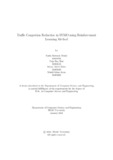Traffic congestion reduction in SUMO using reinforcement learning method
Abstract
The exemplary traffic controlling system is getting helpless because of urbanization and a consistently expanding populace. Living in a cutting-edge time of science and innovation, an advanced arrangement is a beggar description. Reinforcement learning appears to be the advanced promising answer for this endless issue. Thus, proposing a fitting and dynamic methodology to meet the excessive necessity is a significant part of the traffic control system. Our main objective is to using different algorithms in an environment to get the best possible result in order to reducing traffic congestion. Our algorithm ensured the best possible result by comparing different parameters in a SUMO(Simulation of Urban MObility) generated dataset. Firstly, we obtained a result by performing a normal simulation and then performed Q-Learning, Greedy Approach, SARSA, and Bias Q-Learning algorithms. We compared the results from the performed algorithms afterwards. The research is expected to improve productivity in bustling cities by effectively reducing traffic congestion.

